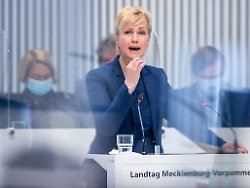Thursday April 22, 2021
Schwesig tore apart the law
“Won’t implement soft federal brakes”
The Federal Council will be presented with the amended Infection Protection Act today. Mecklenburg-Western Pomerania’s Prime Minister Schwesig complains: “This law will not bring us down in the number of infections, but it will level off at a high level.”
The nationwide corona emergency brake is to be waved through by the Federal Council today, but it does not meet with much approval from the state government in Schwerin, for example. “This emergency brake falls far short of the rules that we have agreed upon and which we have long been implementing in Mecklenburg-Western Pomerania, for example,” said Mecklenburg-Western Pomerania’s Prime Minister Manuela Schwesig on ZDF. “That makes doing business on site more difficult because higher incidences are now allowed than we actually set on site.”
From the point of view of the SPD politician, something else weighs more heavily: “This federal law has a serious design flaw. This law will not bring us down in the number of infections, but it will level off at a high level,” said Schwesig. “For example, with an incidence of 150, we have consistently given schools and day-care centers to emergency care,” as agreed by the federal-state conference at the beginning of March. “But we’re not saying we’ll wait five days until we’re back to 162 and open. Rather, we’re saying we have to consistently come under 100 now,” said Schwesig.
The minister reprimanded: “The design flaw in this federal law is: They close at 165, wait five days for them to be below it, for example at 162, and then open again. I can already predict that a week later they will be back over 165 and close. This ping-pong is totally unreliable and will not bring us down in the infected position. ” She also criticized: “The number 165 has not yet been derived sensibly.”
Schwesig counts on the law
The head of government also complained that it was not practical: “On the other hand, there are tightenings that are superfluous. For example, the compulsory test to go for a walk in a zoo. This is much too exaggerated,” criticized Schwesig. “Especially the outside area has to be made accessible for families. That shows that this federal law is far removed from the practice on site.”
“We will not implement this soft federal brake because it does not help people,” announced Schwesig. Instead, your country will stick to its own, stricter rules. “It is better if we get down the infection numbers strictly, consistently and quickly than if we settle at a high infection level and wear people down,” she said.
Nevertheless, Schwesig expects that the law will also pass the Federal Council on Thursday after it has been passed in the Bundestag: “The problem is that we have no way of approving, rejecting or deciding on it,” said Schwesig. “We only have the option of blocking the law with an objection. I don’t see a majority for that.” No country wants to be said to have prevented the emergency brake.
.
